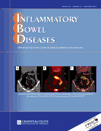Safety and tolerability of concurrent natalizumab treatment for patients with Crohn's disease not in remission while receiving infliximab
Abstract
Background: Natalizumab, a humanized monoclonal IgG4 antibody to α4 integrin, was investigated as a treatment of active Crohn's disease (CD). The safety of natalizumab given in combination with infliximab has not previously been studied.
Methods: Seventy-nine adult patients with active CD (Crohn's Disease Activity Index [CDAI] score ≥ 150) despite ongoing infliximab treatment were randomized 2:1 to receive 3 intravenous infusions of natalizumab (300 mg; n = 52) or placebo (n = 27) every 4 weeks. Patients received infliximab (5 mg/kg) every 8 weeks for at least 10 weeks before randomization and throughout the study. The primary objective was to assess the short-term safety and tolerability of natalizumab in patients concurrently receiving infliximab. Secondary and tertiary objectives included measures of efficacy, health-related quality of life (HRQoL), and effects on inflammatory markers. A subset of patients also participated in a pharmacokinetic/pharmacodynamic (PK/PD) analysis of the effects of concurrent treatment.
Results: Incidence of adverse events (AEs) was similar in the treatment groups. AEs frequently reported in both groups were headache, CD exacerbation, nausea, and nasopharyngitis. No patient had a hypersensitivity-like reaction to natalizumab, whereas 4 patients (5%) experienced reactions to infliximab. Two patients (4%) developed anti-natalizumab antibodies; 10 patients (14%) developed anti-infliximab antibodies. The mean CDAI score decreased with natalizumab plus infliximab but was unchanged with infliximab alone (−37.7 versus +3.5; P = 0.084). Patients in both groups showed small increases in HRQoL (P = 0.811). No drug–drug interactions were noted.
Conclusions: The combination of natalizumab plus infliximab was well tolerated. Several positive trends suggested that treating patients not in remission with infliximab plus natalizumab had greater efficacy than treatment with infliximab alone.
(Inflamm Bowel Dis 2007;13:2–11)




